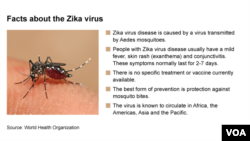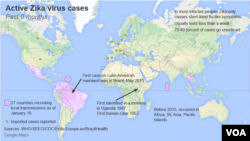President Barack Obama is asking the U.S. Congress for more than $1.8 billion in emergency funding to help fight the Zika virus in the United States and other countries.
U.S. health officials say the funding is critical for developing a vaccine, more efficient diagnostic testing, and for research into suspected links between Zika and microcephaly, a condition in newborns that results in deformed skulls and underdeveloped brains.
In a statement Monday, the White House says the funding also would "support essential strategies to combat the virus," such as rapidly expanding mosquito control programs and providing health care services and support for low income pregnant women.
The U.S. Centers for Disease Control and Prevention has reported 50 laboratory confirmed cases among U.S. travelers in the past two months.
The Zika virus is contracted through bites of a variety of the Aedes mosquito, and researchers have found some preliminary evidence it may then be transmitted through sexual contact. It causes no symptoms in 80 percent of those infected,
However, a massive spread of the virus in Latin America and the Caribbean, coupled with a huge spike in microcephaly births, has led to widespread scientific speculation that the virus may trigger fetal malformations that leave infants devastatingly disfigured and impaired - and their parents bereft of hope.
WATCH: Dr. Fauci on Zika and the Rio Olympics:
"We must work aggressively to investigate these outbreaks, and mitigate to the best extent possible, the spread of the virus," the White House said in its request.
Anne Schuchat, deputy director of the CDC, says women who traveled to Zika infected territories should be tested for the virus even if they don’t have symptoms.
Speaking at a White House Monday, she also said experts expect limited, local outbreaks in the United States -- most of them likely from travelers coming from those affected regions.
The World Health Organization has declared the Zika virus a global public health emergency, as scientists scramble to prove or disprove links between the virus and microcephaly. The WHO also predicts 4 million people could be infected between now and the end of the year.
Last week in Brazil - the epicenter of the Zika outbreak - health officials said they found live samples of the Zika virus in in human saliva and urine samples. But scientists have so far stopped short of saying the virus can spread through human contact.
Separately, Colombian President Juan Manuel Santos reported more than 3,100 pregnant women in his country have been found infected with Zika, with a total infected population of 25,600.
But Saturday, Santos went on national television to stress that no definitive link has yet been established between Zika and microcephaly, either in his homeland or in the 25 other countries where Zika cases are surging.









